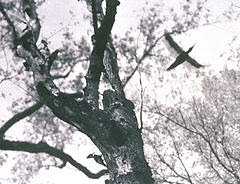 Paris - Door Knocker by noriko.stardust
Paris - Door Knocker by noriko.stardust
Warmer
The following extracts come from quite successful contemporary Anglo-Saxon novels. Both are descriptions of individual French women. Read them and decide which one you prefer. Give your reasons.
Extract 1:
[He] turned to see a young woman approaching. She was moving down the corridor toward them with long, fluid strides… a haunting certainty to her gait. Dressed casually in a knee-length, cream coloured Irish sweater over black leggings, she was attractive and looked about thirty. Her thick burgundy hair fell unstyled on her shoulders, framing the warmth of her face. Unlike the waifish, cookie-cutter blondes that adorned Harvard dorm room walls, this woman was healthy and an unembellished beauty and genuineness that radiated a striking personal confidence.
Extract 2:
The French girl appeared without her boyfriend and without any shoes. Her legs were brown and slim, her skirt short. She padded delicately through the café. We all watched her. The heroin mute, the group of Americans, the Thai kitchen boys. We all saw the way she moved her hips to slide between the tables, and the silver bracelets on her wrists. When her eyes glanced around the room we looked away, and when she turned to the street we looked back.
The following extracts come from quite successful contemporary Anglo-Saxon novels. Both are descriptions of individual French women. Read them and decide which one you prefer. Give your reasons.
Extract 1:
[He] turned to see a young woman approaching. She was moving down the corridor toward them with long, fluid strides… a haunting certainty to her gait. Dressed casually in a knee-length, cream coloured Irish sweater over black leggings, she was attractive and looked about thirty. Her thick burgundy hair fell unstyled on her shoulders, framing the warmth of her face. Unlike the waifish, cookie-cutter blondes that adorned Harvard dorm room walls, this woman was healthy and an unembellished beauty and genuineness that radiated a striking personal confidence.
Extract 2:
The French girl appeared without her boyfriend and without any shoes. Her legs were brown and slim, her skirt short. She padded delicately through the café. We all watched her. The heroin mute, the group of Americans, the Thai kitchen boys. We all saw the way she moved her hips to slide between the tables, and the silver bracelets on her wrists. When her eyes glanced around the room we looked away, and when she turned to the street we looked back.
***
What is 'Spirit'?
It could be argued that the difference in the texts is that one has 'spirit' and the other does not; but just what is spirit? Read the following texts and find out. There are questions that follow.
Reading Comprehension 1
Of certain products that are expected to reveal themselves at least in part to be fine art, we say that they have no spirit, even though we find nothing to censure them as far as taste is concerned. A poem may be quite nice and elegant and yet have no spirit. A story may be precise and orderly and yet have no spirit. An oration may be both thorough and graceful and yet have no spirit. Many conversations are entertaining, but they have no spirit. Even about some women we will say she is pretty, communicative, and polite, but she has no spirit. Well, what do we mean here by spirit?
Spirit (Geist) in an aesthetic sense is the animating principle in the mind. But what this principle uses to animate [or quicken] the soul, the material it employs for this, is what imparts to the mental powers a purposive momentum, i.e., it imparts to them a play which is such that it sustains itself on its own and even strengthens the powers for such play.
Now I maintain that this principle is nothing but the ability to exhibit aesthetic ideas; and by an aesthetic idea I mean a presentation of the imagination which prompts much thought, to which no determinate thought whatsoever, i.e., no [determinate] concept, can be adequate, so that no language can express it completely and allow us to grasp it. It is easy to see that an aesthetic idea is the counterpart (pendant) of a rational idea, which is, conversely, a concept to which no intuition (presentaion of the imagination) can be adequate.
For the imagination ([in its role] as a productive cognitive power) is very mighty when it creates, as it were, another nature out of material that actual nature gives it. We use it to entertain ourselves when experience strikes us as routine. We may even restructure experience; and though in doing so we continue to follow analogical laws, yet we also follow principles which reside higher up, namely, in reason (and which are just as natural to us as those which the understanding follows in apprehending empirical nature). In this process we feel our freedom from the law of association; for although it is under that law that nature lends us material, yet we can process that material into something quite different, namely into something that supresses nature.
Questions
Note: For the vocabulary section, try to work out the meaning of the words in italics from their context; if you can't use a dictionary - Merriam-Websters- Online Dictionary:
Paragraph 1
Vocabulary : thorough
What is the writer's objective in this essay?
What do you think 'spirit' is?
Who do you think is the author of this essay?
Paragraph 2
Vocabulary: imparts, purposive momentum, sustains, strengthens
What is the function of the phrase 'the material it employs for this'?
Spirit employs a substance to affect the mind. Describe what it does to the mind?
Paragraph 3
Vocabulary: prompts, whatsoever, to grasp, counterpart,
What is the function of the phrase 'which prompts much thought'?
Why can't aesthetic ideas be properly expressed in words?
Paragraph 4
Vocabulary: mighty, strikes, though, reside, lends, supresses
How does imagination bring freedom?
Reading Comprehension 2
The following extract, from an article by Mark Sagoff, looks into the tension between something we know intuitively to be true and our inability to prove it empirically. It raises two questions relevant to undergrad and research students. Firstly, should we dismiss our intuitions and abandon any attempts to explain what we suspect to be true? Secondly, should we try to prove our intuitions to be true and accept that the problem may lie with our the inadequacies of our current knowledge and models?
Read each extract and answer the questions that follow:
Extract 1
Research in environmental ethics and environmental science takes as a premise the supposition that ecological or natural communities are governed by principles of organisation. While this assumption has not yet been proven it nevertheles draws compelling evidence from the aesthetic judgements that accompany our perceptions of the natural world, in particular of its most magnificient and glorious productions, such as old growth forest, clear -watered lakes wild savannas and ocean tipped estuaries. Few of us experience these kinds of places without becoming convinced that they possess an intrinsic form or unity, or an organisation mode.
1) What is central assumption on which environmental science and ethics is founded.
2) Even though there is no proof for order in ecosystems, scientists believe that is there - why is this?
Extract 2
One way to understand the free lawfulness or dynamic unity of an ecosystem may be to invoke the concept of an aesthetic idea which the eighteenth century German philosopher Immanuel Kant introduced in his Critique of Judgement (1790, Sec. 49). An aesthetic idea in the perception of an object is a unity recognised by the imagination for which no cognitive concept is adequate. One can say that an asethetic idea exhibits an order that is always straining after a rational cognitive or causal explanation, even if no such empirical principle of organisation can be found. The unity of ecosystems as they appear to us- or the beauty of places in the natural world – in this view exists but cannot be reduced to rational concepts of the sort sought by empirical science.
3) The author tries to define the idea that when we see something beautiful we consider that it has order. He uses three different terms; what are they?
4) The word 'straining' could be best repaced by: A) seeking B) exercising C) striving D) searching
5) 'sort' and 'sought' are homonyms; that is, they have the same pronunciation but different meaning. Explain their different meanings.
ANSWERS
Reading Comprehension 1
Of certain products that are expected to reveal themselves at least in part to be fine art, we say that they have no spirit, even though we find nothing to censure them as far as taste is concerned. A poem may be quite nice and elegant and yet have no spirit. A story may be precise and orderly and yet have no spirit. An oration may be both thorough and graceful and yet have no spirit. Many conversations are entertaining, but they have no spirit. Even about some women we will say she is pretty, communicative, and polite, but she has no spirit. Well, what do we mean here by spirit?
Spirit (Geist) in an aesthetic sense is the animating principle in the mind. But what this principle uses to animate [or quicken] the soul, the material it employs for this, is what imparts to the mental powers a purposive momentum, i.e., it imparts to them a play which is such that it sustains itself on its own and even strengthens the powers for such play.
Now I maintain that this principle is nothing but the ability to exhibit aesthetic ideas; and by an aesthetic idea I mean a presentation of the imagination which prompts much thought, to which no determinate thought whatsoever, i.e., no [determinate] concept, can be adequate, so that no language can express it completely and allow us to grasp it. It is easy to see that an aesthetic idea is the counterpart (pendant) of a rational idea, which is, conversely, a concept to which no intuition (presentaion of the imagination) can be adequate.
For the imagination ([in its role] as a productive cognitive power) is very mighty when it creates, as it were, another nature out of material that actual nature gives it. We use it to entertain ourselves when experience strikes us as routine. We may even restructure experience; and though in doing so we continue to follow analogical laws, yet we also follow principles which reside higher up, namely, in reason (and which are just as natural to us as those which the understanding follows in apprehending empirical nature). In this process we feel our freedom from the law of association; for although it is under that law that nature lends us material, yet we can process that material into something quite different, namely into something that supresses nature.
Questions
Note: For the vocabulary section, try to work out the meaning of the words in italics from their context; if you can't use a dictionary - Merriam-Websters- Online Dictionary:
Paragraph 1
Vocabulary : thorough
What is the writer's objective in this essay?
What do you think 'spirit' is?
Who do you think is the author of this essay?
Paragraph 2
Vocabulary: imparts, purposive momentum, sustains, strengthens
What is the function of the phrase 'the material it employs for this'?
Spirit employs a substance to affect the mind. Describe what it does to the mind?
Paragraph 3
Vocabulary: prompts, whatsoever, to grasp, counterpart,
What is the function of the phrase 'which prompts much thought'?
Why can't aesthetic ideas be properly expressed in words?
Paragraph 4
Vocabulary: mighty, strikes, though, reside, lends, supresses
How does imagination bring freedom?
Reading Comprehension 2
The following extract, from an article by Mark Sagoff, looks into the tension between something we know intuitively to be true and our inability to prove it empirically. It raises two questions relevant to undergrad and research students. Firstly, should we dismiss our intuitions and abandon any attempts to explain what we suspect to be true? Secondly, should we try to prove our intuitions to be true and accept that the problem may lie with our the inadequacies of our current knowledge and models?
Read each extract and answer the questions that follow:
Extract 1
Research in environmental ethics and environmental science takes as a premise the supposition that ecological or natural communities are governed by principles of organisation. While this assumption has not yet been proven it nevertheles draws compelling evidence from the aesthetic judgements that accompany our perceptions of the natural world, in particular of its most magnificient and glorious productions, such as old growth forest, clear -watered lakes wild savannas and ocean tipped estuaries. Few of us experience these kinds of places without becoming convinced that they possess an intrinsic form or unity, or an organisation mode.
1) What is central assumption on which environmental science and ethics is founded.
2) Even though there is no proof for order in ecosystems, scientists believe that is there - why is this?
Extract 2
One way to understand the free lawfulness or dynamic unity of an ecosystem may be to invoke the concept of an aesthetic idea which the eighteenth century German philosopher Immanuel Kant introduced in his Critique of Judgement (1790, Sec. 49). An aesthetic idea in the perception of an object is a unity recognised by the imagination for which no cognitive concept is adequate. One can say that an asethetic idea exhibits an order that is always straining after a rational cognitive or causal explanation, even if no such empirical principle of organisation can be found. The unity of ecosystems as they appear to us- or the beauty of places in the natural world – in this view exists but cannot be reduced to rational concepts of the sort sought by empirical science.
3) The author tries to define the idea that when we see something beautiful we consider that it has order. He uses three different terms; what are they?
4) The word 'straining' could be best repaced by: A) seeking B) exercising C) striving D) searching
5) 'sort' and 'sought' are homonyms; that is, they have the same pronunciation but different meaning. Explain their different meanings.
ANSWERS
Links
Quality - Zen and the Art of Motorcycle Maintenance
References
Swan, Michael (1996) Practical English Usage. Oxford







+II+-+socialist+art+by+night+_eulen.jpg)









No comments:
Post a Comment